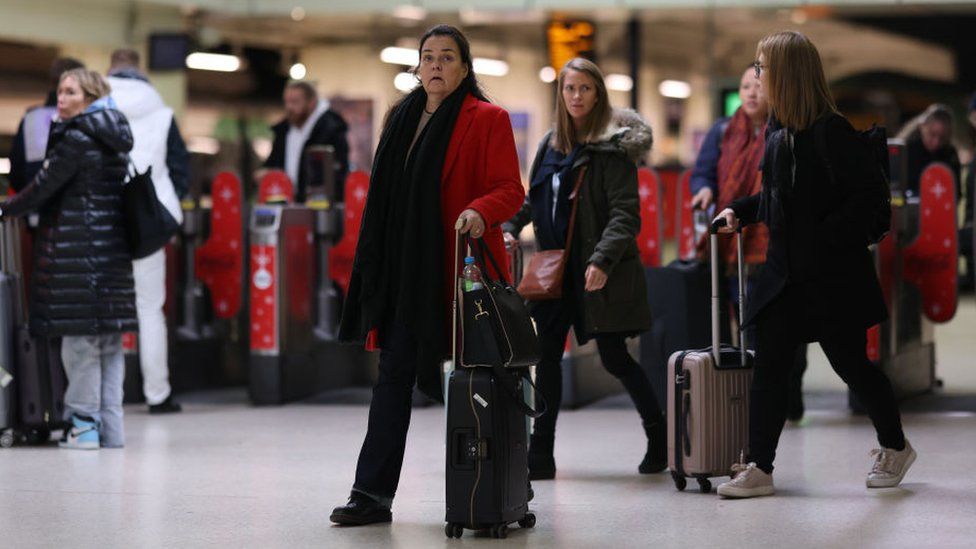ARTICLE AD BOX
 Image source, Getty Images
Image source, Getty Images
Most train companies are likely to be affected, and Network Rail advises to "only travel if absolutely necessary"
By Daniel Thomas
Business reporter, BBC News
Train passengers are braced for major disruption this week, as a series of strikes is set to bring the UK's rail network to a standstill.
About 40,000 rail workers will walk out on Tuesday, Wednesday, Friday and Saturday as part of a long-running row over jobs, pay and conditions.
It comes after members of the UK's biggest rail union, the RMT, rejected fresh pay offers and vowed to fight on.
But the government says it will not back down, despite the "damage" done.
Most train companies across Britain are likely to be affected, and Network Rail has urged passengers to "only travel if absolutely necessary".
Travellers are advised to check their train-operating company's website before setting out, with delays and cancellations also likely on the days around the strikes.
The RMT has held a series of strikes since the summer that have shut much of the rail network in England, Scotland and Wales and threaten to hit businesses in the run-up to Christmas.
Workers are calling for better conditions and pay rises to match the pace of inflation, with the cost of living rising at its fastest rate for more than 40 years.
But the government has ruled out inflation-linked wage increases, and rail bosses say big changes are needed to modernise the railway.
On Monday, Network Rail, which operates the UK's rail infrastructure, said the union was causing "misery" after its members rejected a fresh pay deal.
Rail Minister Huw Merriman meanwhile urged RMT leader Mick Lynch to return to the negotiating table, adding: "The government's resolve is clear: we want these strikes taken down, and we want a better and more resilient railway for the future."
But Mr Lynch accused the government of doing nothing to prevent the walkouts and effectively wanting to ban such action with tough new anti-strike laws.
"Our members, along with the entire trade union movement will continue their campaign for a square deal for workers, decent pay increases and good working conditions," he said.
What's been happening in the dispute?
The RMT is involved in two negotiating battles, one with Network Rail, where it represents around 20,000 signallers and maintenance workers, and the other with the Rail Delivery Group (RDG), where it represents about 20,000 workers at 14 train companies.
Last week, the union rejected an offer from the Rail Delivery Group which would allow for a 4% pay rise this year and another 4% next year, arguing it did not meet its criteria for pay or conditions.
Among other changes it would have seen ticket offices closed or repurposed, more Sunday working and greater use of part-time contracts.
But Mr Lynch said it would mean "the loss of thousands of jobs" and the use of "unsafe practices".
Meanwhile, 63.6% of RMT members at Network Rail rejected a deal on Monday that would have given them a 5% pay rise this year and a 4% rise in 2023.
The union said the offer was "substandard" and depended on big changes to working practices, as well as 1,900 job losses, although Network Rail insisted the cuts could be achieved voluntarily.
After this week's walkouts, RMT members at both groups will strike again on 3-4 January and 6-7 January.
In addition, members at Network Rail will go on strike from 18:30 on Christmas Eve until 06:00 on 27 December.
Mr Lynch has called on the prime minister to meet him to attempt to resolve the dispute.
But on Monday Rishi Sunak's official spokesman said: "We are not seeking to impose government over and above either the independent pay review process or ongoing discussions between employers and the unions.
"We won't be changing the process."

 2 years ago
39
2 years ago
39








 English (US) ·
English (US) ·